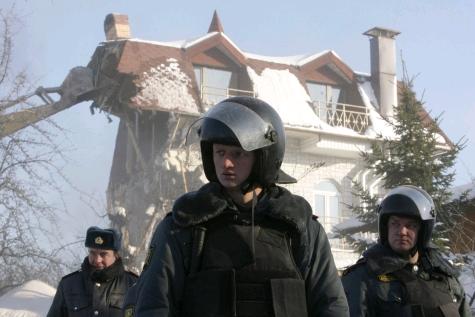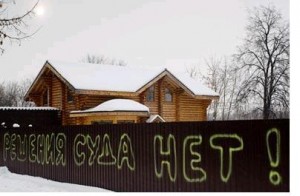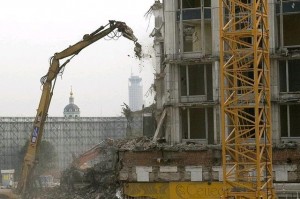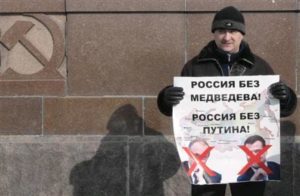Russia's Intifada Against the 'Kompromat State'

“Bailiffs and riot police had been ordered to evict scores of people and tear down their homes, all apparently unannounced”, reports Al Jazeera, describing a scene familiar to anyone who has followed the Israeli-Palestinian conflict.
“The bulldozers continued their work,”, continues the BBC, “tearing through the walls and windows of homes, turning them into piles of rubble within a matter of hours. On one mound of shattered concrete, glass and crumpled metal, lay children’s toys and a black, leather shoe”.
Yet this is not the Gaza strip, but central Moscow, during last week’s federally mandated demolition of scores of private homes in the suburb of Rechnik, many of which had stood there for over three decades.
Authorities insist that the houses had been built illegally on land given by a Soviet state owned enterprise to its workers for the purpose of allotments and greenhouses, not home construction.

But residents, many of whom have lived unmolessed on the land since the 70s, maintain that the real reason for the evictions is that “the land on which the village stands is prime real estate worth billions of roubles (hundreds of millions of dollars or pounds)”.
According to a report, “Moscow’s Mayor Yuri Luzkhov, a man criticized for the destruction of swathes of the capitals historic centre, insists the demolition is not a case of selective justice”.

His record certainly suggests otherwise. According to a 2004 Moscow Times article posted by the Moscow Architecture Preservation Society:
Since Luzhkov became mayor in 1992, preservation experts estimate that more than 400 historical buildings from the 17th century onwards have been destroyed, including 60 pamyatniki, or listed buildings, which by law should be untouchable.
“Just as Stalin and Brezhnev destroyed Moscow in their day, Luzhkov is doing the same now,” architect Gennady Kholmansky said. “If he could, he’d put underground parking under St. Basil’s Cathedral.”
Of course, srictly speaking, the buildings at Rechnoi may well not have been built in full legal compliance with Soviet laws. But those laws have since been modified and overturned countless times.
Remember that hoary Yeltin era anecdote that if a Russian were to follow every (often contradictory) tax law, he would end up paying 120% of his salary to taxes? Unfortunately, it remains very difficult for citizens accomplish anything without breaking some minor or archaic law or other, especially to do with business, taxes or land ownership.
Indeed, Russia’s murky, unsettled and constantly shifting legal and tax climate, together with stifling and corrupt bureaucracy, provide perverse incentives for Russian citizens to cut corners and conduct their transactions outside of the law. Especially because the ineffectual and corrupt state of law enforcement means that most minor infractions will remain unpunished and unnoticed; it’s often simply too much trouble and risk to follow the laws, and too easy to avoid them.
Such legal limbo feeds directly into authoritarianism, making Russia today a
‘Kompromat state’: because there is scarcely a single businessman or bureaucrat or homeowner who has not at some point broken some law or other, the state is in a unique position to blackmail its citizens.
Everyone has a file, which can be selectively deployed by the authorities at any point.
But whereas the East Germans used such blackmail to recruit people into the Stasi, the modern and much cannier Russian government uses Kompromat to make money first; the destruction of its political enemies along the way is a sweet bonus.
That is how Khodorkovsky was jailed. He was not a totally innocent man, but no Russian businessman is or can be. Yet when his firm got too wealthy, his control of lucrative oil infrastructure too strong, and his political aspirations too bold, Putin quietly dusted the cob-webs from his police file.
Liberal groups in Russia and the West hoped that the Khodorkovsky trial would make the people rise up against the Kompromat state, but the Russian people didn’t care about the fate of som tarnished billionaire.
But now that the Kompromat state is deploying the same tactics against more or less ordinary people, that moment might finally have come.
Today’s demonstration in Moscow against a ban on the right to peacefully gather (guaranteed by Article 31 of the constitution) was a good start.



